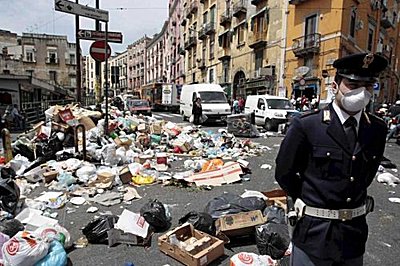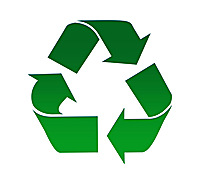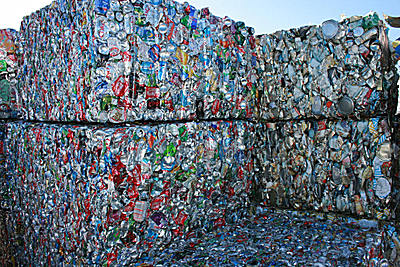It's getting time for me to write down some things I have been "preaching" the last years.
100% Recyling - you may react that it is impossible. Before I gonna explain and share the benefits of 100% recycling I like to make you aware that
100% recyling is already a reality, because when you put the garbage on a landfill and cover it with earth, that garbage is still there; it isn't "used" but it
will affect the environment, it is only a question how much, how far, how long and how we cope with it.
In a way, to put something aside, in psychological context, is denial and finally leads to fragmentation - and certainly not a way to resolve something; and so this is true in the ecological recycling context, and so the solution is just postponed, but not resolved. So, in this way, 100% recycling is a reality, we just deny to cope with it actively, we put it aside and hope it doesn't penetrate the containers.
It is a much more natural way to deal with the reality that there is 100% recycling, by actively achieve 100% recycling.
In other words, in 100% recycling economy there will be no garbage anymore - nothing is thrown away, nothing is worthless in the sense it's garbage; eventually "garbage" as word ceases to exist.

 Naples, Italy, 16 May 2008 |
How shall this work? In essence, the producer of a material must take the material back again, because
it knows the material, it knows (or will learn) to recycle it.
This means in a technical context, all material becomes traceable, marked: every material contains a signature embedded within the material which contains an unique identifier of the producer. Material which contains no unique identifier is not permitted to be sold, solely for personal use.
We still can use a container where we put all things we have no use anymore, and that material is then automatically sorted by the producer, and not by the material, and the producers receive their material back.
Companies may create unified recycling depots, e.g. all plastic produces create a new company which takes back all plastics, or all supermarkets take back the wrappings of their products.
Companies which do not take back the material directly from the consumers must join a network, like an insurance, which operates to bring the material back to the producers, a reverse outlet, an inlet.
A landfill, a garbage depot no longer shall exist, but a depot of material going back to the producers. Eventually, if the producers are smart, the materials coming back are reused directly again, and not passed back further in the chain of producers - and reduce costs thereby. Such reduction of cost would directly benefit to reduce overall resources to extract base material from Earth.
A small example: the plastic toy from China.
Within the oil is a signature from the oil source, the PVC manufacturer in China adds another signature, and so does the painting on the toy, and finally the product packaged gets another signature. At the end a plastic toy may have a dozen signatures of all involved companies; those are all responsible to take back the material. It will be in the interest of the contributing companies to form a way to separate the paint from the toy, and the PVC back separately, and the responsible company which must take it back is the toy producer, and it must know how to separate all the material it once used to put together to make a toy.
Another example: the wodden toy.
It also gets a signature, and if the toy has been made without any glue it may only contain two signatures: from the wood company, and from the company which formed the toy out of wood. The last instance which sold it, must take back the toy again, or a unified wood recycle company formed by all wood working companies, and eventually the wood company takes the toys back and recycles them. If glue was used, then three signatures will be there, maybe the wood company is also producer of the glue, and knows therefore how to recycle glued wood again as well.
Another more complex example: a computer laptop.
A laptop is made of hundreds of components, and the components themselves contain multiple materials, some of them are very rare and precious. In this case the last stage, the laptop manufacturer is responsible to take back the laptop to recycle, and that company relies on the component manufacturer who themselves can rely on the companies which delivered the raw material - the chain top down to the bottom level, the reverse way the product was made, it goes back to the very basic raw material.
The signature marks the material and ties it to a manufacturer, which is preserved to most manufacturing processes. It is in the interest of a manufacturer to preserve the signature of the previous manufacturer so they maintain to be responsible in the track of production and its reverse way: the recycling tracking path.
If you make your own tools, or become a producer of a small series and you give it away or sell it, then the glue, the screws and the aloy used for the screws contain already a wide range of signatures. For personal use only that producer is not reliable for the product, but the companies which made the components which were used to produce something new. Personal sold products must be disassembled by the buyer, and those parts will be taken back by the respective producers.
At first sight, this all looks like an awful complex system, but it's actually not more complex than how a product ends up being made. Like each manufacturer maintains an accountant book, thereby all involved parties which contributed to the product are known. In the same way the reverse way is established, based on the already available information, and additional all the materials are tied to the companies via their respective signatures, so responsiblity cannot be waved or denied - a technical solution to enforce responsibility.
What are the costs, what are the gains?
The actual costs are of minor relevance, because a society which isn't sustainable cannot survive in the long term, and costs are just postponed and not accounted - which is the worst way to handle actual costs. Eventually a society faces its postponed problems which one way or another find its way back to the point where the problem was created.
The actual gain is . . . a truly sustainable society, who acts indeed economical, ecological and sustainable thereby.
Life itself is sustainable by its definition, it's its very core; any society or corporation which aims to exist thereby has to be sustainable.
Update 2009/10/10: www.StoryOfStuff.com  , very informative documentary going along the same lines
, very informative documentary going along the same lines








